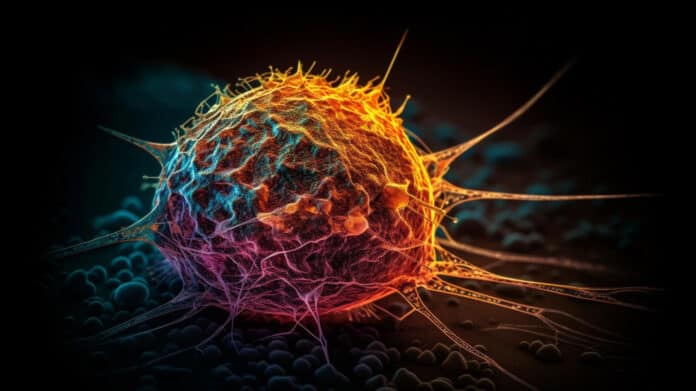In a groundbreaking study, researchers at UCLA have made significant strides in identifying potential biomarkers that could predict a positive response to cancer immunotherapy. Immunotherapy has emerged as a promising treatment option for various cancers, but its effectiveness varies among individuals.
By investigating molecular signatures and genetic markers, the UCLA team aims to enhance personalized Medicine by identifying patients most likely to benefit from immunotherapy. This breakthrough has the potential to revolutionize cancer treatment and improve patient outcomes, bringing us one step closer to a future where immunotherapy plays a vital role in eradicating cancer.
UCLA scientists have discovered potential biomarkers that can indicate the response of individuals diagnosed with metastatic melanoma to immunotherapy. Their research reveals that activated T cells release a protein called CXCL13, which attracts more B cells and T cells to the tumor site. This collaboration between B cells and T cells enhances the activation of T cells and their ability to combat cancer.
The study found that this cooperation correlated with improved survival in metastatic melanoma patients undergoing immunotherapy but not in those receiving targeted therapy. These findings significantly impact refining melanoma treatment strategies and enhancing treatment effectiveness.
Co-senior author of the paper, Willy Hugo, Ph.D., assistant professor of Medicine in the division of Dermatology at the David Geffen School of Medicine at UCLA and member of the UCLA Jonsson Comprehensive Cancer Center, said, “Based upon our data, increased presence of B cells and CXCL13 protein in the tumor after immunotherapy treatment may be predictive biomarkers for durable immunotherapy response in melanoma patients and may be avenues to enhance the response rate to immunotherapy in patients diagnosed with melanoma. For example, combining anti-PD1 treatments with CXCL13 or B cell-directed therapies may be strategies for patients who fail to respond to checkpoint immunotherapy alone.”
The use of immune checkpoint inhibitors has revolutionized the treatment of melanoma, allowing patients to live longer and healthier lives. However, predicting the effectiveness of this therapy remains challenging. Identifying the mechanisms behind tumor resistance and determining which patients will respond to treatment is crucial. This knowledge is essential for developing improved therapies and increasing the response rate of immune checkpoint inhibitors.
UCLA researchers conducted a study to explore the factors influencing durable antitumor immune responses in melanoma patients treated with checkpoint immunotherapy compared to targeted therapies. By analyzing RNA-seq profiles of pre-and post-treatment melanoma samples, they discovered that immunotherapy triggered a substantial influx of diverse B cells, while targeted therapy did not. Additionally, T cells exhibited a significant increase in the production of CXCL13, a chemotactic factor for B cells, specifically in response to immunotherapy. These findings shed light on the distinct immune responses induced by different treatment approaches in metastatic melanoma patients.
Co-senior author Melissa Lechner, MD, Ph.D., and her team from UCLA have suggested that the protein CXCL13 plays a crucial role in facilitating the interaction between T and B cells within the tumor microenvironment, leading to positive responses to checkpoint immunotherapy. They emphasize the need for further research to determine if these pathways can be enhanced in non-responders, potentially improving treatment outcomes. The findings also support the idea that B cells can present antigens to T cells in the tumor microenvironment, indicating the potential of B cell-based cancer vaccines to enhance the effectiveness of immune checkpoint immunotherapies.
The research team plans to investigate these mechanisms in preclinical cancer models further to gain deeper insights. They also aim to explore whether manipulating antigen-presenting B cells, and CXCL13 can enhance antitumor immune responses in non-responding patients. These future studies could pave the way for improved treatment strategies and better patient outcomes in melanoma and potentially other cancer types.
Journal Reference:
- Lizhong Ding, Lu Sun, et al. Antigen presentation by clonally diverse CXCR5+ B cells to CD4 and CD8 T cells is associated with a durable response to immune checkpoint inhibitors. Frontiers in Immunology. DOI: 10.3389/fimmu.2023.1176994
